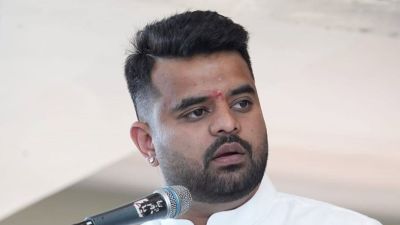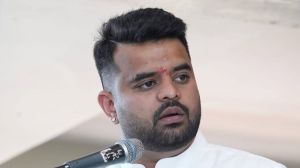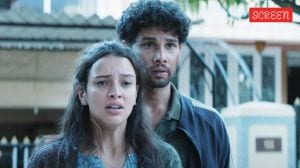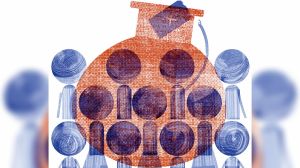Deve Gowda’s son-in-law, BJP candidate Dr Manjunath counts on many factors: Modi’s popularity, his own patients, JD(S) voter base
In his poll debut, the Bangalore Rural candidate will take on the Congress heavyweight and three-time MP DK Suresh.
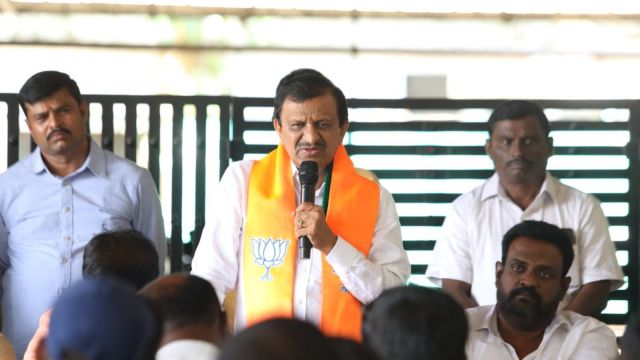 "I am not contesting alone. I am backed up by both BJP and JD(S), who have a strong base in this constituency," Dr Manjunath said. (Express photo)
"I am not contesting alone. I am backed up by both BJP and JD(S), who have a strong base in this constituency," Dr Manjunath said. (Express photo)Dr C N Manjunath, 66, a renowned cardiologist and son-in-law of former prime minister HD Deve Gowda, is all set to make his poll debut by contesting the Bangalore Rural Lok Sabha constituency on a BJP ticket. He will take on the Congress heavyweight and three-time MP DK Suresh, who is also the brother of Karnataka Deputy Chief Minister DK Shivakumar. Known for his calm demeanour and down-to-earth approach, Manjunath may be new to politics, but not in public service.
In an interview with indianexpress.com, Dr Manjunath talked about what this election means to him, his learnings from Deve Gowda and his assessment on India’s public health infrastructure.
Excerpts:
You have always said that you are a politician by accident and that politics has pulled you in. Are you a reluctant politician?
Dr Manjunath: No, once you have decided (to enter politics), you have to go full swing. There is no question of hesitancy and all. While taking the decision I did hesitate, because I had a long stint as a cardiologist and when you are shifting from that profession, it is a very important decision. Naturally, there were consultations and some ifs and buts. But once you decide to contest, there are no half measures now. My mind and soul is fully into politics now.
You are taking on a Congress heavyweight who is a three-time MP. How challenging is this election for you?
Dr Manjunath: I am not contesting alone. I am backed up by both BJP and JD(S), who have a strong base in this constituency. For example, there are five rural segments where JD(S) has their strong base and BJP has their own strength. In urban areas, BJP has a strong base. Also, there is a difference between Lok Sabha elections and Assembly elections. The way people look at Assembly elections is different from the way they look at Lok Sabha elections. In many instances we have seen, the party that wins Assembly elections has lost in Lok Sabha elections in the same area.
If you go back and review the 2019 election, JD(S) was with Congress and BJP contested solo. Even at that time they had taken 6.75 lakh votes (in Bangalore Rural). Now BJP is with JD(S). So mathematically, figures are in our favour. But I believe the chemistry is different. I can see a wave of change. Election is an opportunity. It is always a contest and it is a tough contest. A lot of factors are favouring me. There is also a feeling that Narendra Modi should become the prime minister for the third time. Plus with my own contribution to the society, there is a gratitude factor in most of the villages. In any village in the nook and corner of the state, there are at least 10-15 patients who have benefited by us (Jayadeva Institute). They are the ambassadors for my campaign.
Why is this election important to you?
Dr Manjunath: I have brought some revolutionary changes in the cardiac healthcare system in a public hospital. A lot of friends and well-wishers from West Bengal, Orissa, Delhi, Tamil Nadu, Kerala and Andhra Pradesh told me that they don’t see any other example where a public institution has reached such a great level. Today it is a competitor to the private sector. They felt that my administrative skills, my professional ideology and leadership qualities should not be limited to the Karnataka state. They felt it would be better if I got an opportunity at the national stage to benefit the country. Hence my goal is to take the Jayadeva model of affordable healthcare to the national level. This model is being appreciated by London School of Economics, Leadership School of Singapore, IIM-Bangalore and also appreciated by former president of USA Barack Obama. Moreover, I believe there are not many good doctors who are administrators and it is proved beyond doubt. However, people believe that I am good at both—a good doctor and an administrator.
How do you read the politics of Bangalore Rural constituency?
Dr Manjunath: Even before joining politics, I am well known to people of the state. This is because of my long tenure as the director of the institute. We have treated about 75 lakh patients and conducted over eight lakh procedures. As a doctor, we don’t just treat patients. We will also be understanding their social and economic background. This constituency was earlier held by BJP and JD(S) only. Secondly, there is a feel-good factor about Narendra Modi becoming prime minister and even former prime minister Deve Gowda and former chief ministers HD Kumaraswamy and Yediyurappa have made big contributions to this constituency. My father-in-law’s roots are very strong in this region.
Do you think the contest in Bangalore Rural is dictated by caste?
Dr Manjunath: I believe it’s not caste. People from all walks of life are supporting. In Lok Sabha elections, individual performance may not be the factor all the time. It will have some impact, but in Lok Sabha elections national issues overrides local issues. Sometimes better performing candidates have lost the elections. Moreover, people also want a change. Sometimes there will also be anti-incumbency factors that will decide the results.
What is your take on the five Congress guarantees? Do you think women will swing in Congress’ favour?
Dr Manjunath: That is the manifesto for the Assembly elections, which are over. The guarantees will have a lot of financial implications with a negative impact on development. I learnt that because of the five guarantee schemes, they (Congress government in Karnataka) has already taken a loan of Rs 1 lakh crore. This will have a huge negative cascading effect on development. Also the Government of India’s welfare schemes are already in place. For example, they are providing 5 kg of rice. Under Pradhan Mantri Kisan Samman Yojana they are giving Rs 6,000 to farmers, gas connections, drinking water facilities, express highways, etc. Therefore so many central government welfare schemes override the Congress’s guarantees.
What have been your takeaways from Deve Gowda? What political advice did he give you?
Dr Manjunath: Although I am from a political family, I have kept myself out of politics. Whenever I used to interact with him (Deve Gowda) during health check-ups, I saw that he is an encyclopedia of many things. He tells me how he has implemented various projects, how he overcame obstacles and how he implemented Delhi metro, among other things. He has a very strong memory and he is a voracious reader. Most importantly, he does great homework and studies in depth before making decisions. He told me that when he had gone campaigning for Ramakrishna Hegde during the 1983 Kanakapura elections, within six months post election, he built six tanks and one small dam. He also shared with me the obstacles he faced while building the Almatti dam. I have learnt a lot hearing about his experiences. As for political advice, I still did not find enough time to spend with him as we both are busy campaigning.
Both HD Kumaraswamy and Deve Gowda had contested this seat earlier and won. Does this trend give you the pressure to deliver the same way?
Dr Manjunath: This is certainly my maiden election. If you have already achieved something in another profession, the work culture automatically gets transferred to the other profession. Commitment, hard work, willing to help people, trying to bring change—I am already equipped with this basic mindset to fight this election.
What is your assessment about the public health sector in India?
Dr Manjunath: Thirty per cent of healthcare is provided by the government sector but 70 per cent is still in the hands of the private sector. It is important to strengthen the public infrastructure with more manpower. Although the doctor-population ratio in India is better than the WHO standards, there is maldistribution. There are more doctors in the city than in rural areas. The number of medical colleges has increased from 380 to 750, MBBS seats have increased from 70,000 to 1.3 lakh and postgraduates have increased from 30,000 to 90,000 in India. The aspirants for medicine have become more.
In India we have around 13 lakh allopathic doctors but our requirement is 17 lakh. By 2027, we will be reaching that goal. By 2027 or 2028 there will be three doctors per 750 people in India. The government institutions are focusing more on construction, but focus should shift from construction to creation of posts. Then there has to be some amount of decentralisation and delegation of powers to the heads of the institution. Otherwise, decision making will be delayed. Now under the central government’s scheme, there are PMSSY (Pradhan Mantri Swasthya Suraksha Yojana) Hospitals. We have one in Victoria Hospital in Bengaluru. But we have only 30 beds for each speciality, which is not enough. We need 100 beds for each speciality. Now that the number of AIIMS has increased, there are a lot of recruitment issues. We need to simplify the procedure and there should be fast-tracking of the recruitment process.
Some sort of incentives and motivation should be given to prevent brain drain. Moreover, we should have established trauma care centres for every 150 km on highways because road accidents account for 13 per cent of deaths in India. Moreover 35 per cent of deaths in India are due to heart attacks and heart-related issues. Like cancer, cardiac-related diseases should be declared as diseases of national importance. In addition, malnutrition among children and women should be addressed more effectively and the ambulance services should be more streamlined.
How have your day-to-day activities changed after joining politics?
Dr Manjunath: Campaigning is always hectic. But I am used to working very hard. I used to visit a lot of patients, doing procedures… Normally I am used to walking 10,000 steps, out of which 5000 steps I used to walk in the hospital itself. Now it has slightly reduced. It is because I campaign mostly in an open jeep under the hot sun. During campaign days, I eat a lot of fruits. I also carry juice and water from home.
Bangalore Rural will vote on April 26.



